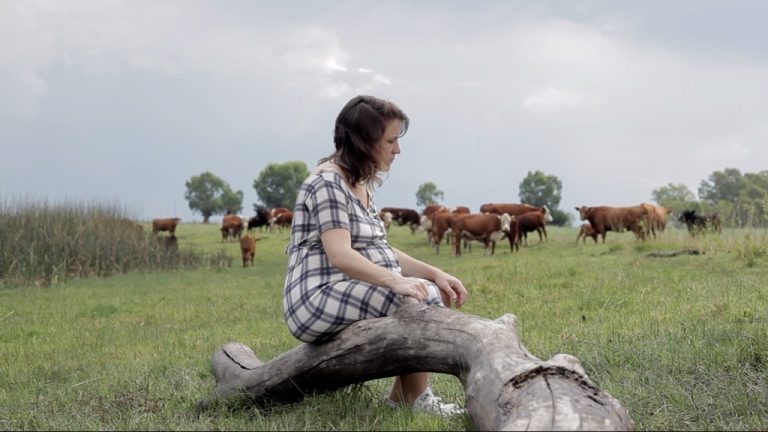
Laura Citarella’s Thrilling And Mysterious ’Trenque Lauquen’
05 December, 2023Trenque Lauquen, the second solo work (and third feature after Dog Lady, co-directed with Verónica Llinás in 2015) from Argentine director Laura Citarella, is a beautifully complex treatise on the notion of discovery, the wholly biased act of interpretation and the porous unreliability of the archive.
What begins as a two-man search for missing botanist Laura (played by script co-writer Laura Paredes) spirals into a two-part, 12-chapter study that makes us question the actual possibility of answers.
The film poses countless storylines without ever feeling compelled to resolve them. We follow Rafael (Laura’s highly strung city-type boyfriend played by Rafael Spregelburd) and Ezequiel (her quiet colleague played by Ezequiel Pierri) around local farms and villages trying to track her down. We see flashbacks of Laura and Ezequiel developing an intimate bond as they too track down yet another mystery woman, also missing from the town’s history.
These avenues are developed and interesting but we are encouraged to focus on the journey and the pieces of the puzzles rather than their outcomes – an aspect only heightened by the brilliant and instructive musical direction of Gabriel Chwojnik which includes strings, pianos, horns and a bassoon.
Citarella’s agile camera movements too, alongside many external framings of scenes keep us looking in certain directions but so often keep us firmly on the outside as well.
We are privileged to so many different narrators and perspectives, yet we cannot confidently determine which, if any, are reliable. Characters often repeat back what has been said to them, letting words linger in the air as their meaning is received or scrutinised.
“There are all kinds of clues,” says Laura’s boyfriend Rafael – one of the two men searching for her – into his phone at the very start of Part One. A comment characters will express over and over throughout the two features as they search for traces, avenues and indications. And that is precisely the substance of Trenque Lauquen and its many subplots. We are flush with materials, angles and leads. There are re-enactments, flashbacks, imaginings, written reports, oral histories and most importantly gaps all contributing to the interwoven and sometimes contradictory fabric of the stories. For this reason, it’s thrilling to unpack each one that emerges even though there’s no end reward.
Part Two somehow both continues the themes and quests of the first and yet completely flips the script. Beneath the mystery there are more mysteries. Ezequiel continues to search for Laura, assuming she wants to be found. He asks for help from her employer at the radio station only to learn there is yet another story – a self-recording that Laura has created for her boss sharing the bizarre tale of a creature from the lake (is it a child, a monkey, a reptile?). Laura finds herself at the centre of a local scandal that reaches its conclusion just before the start of Part One. Yet again, we follow her down the rabbit hole to no particular end. In this case we are withheld the long-awaited unveiling of this other-worldly creature.
Instead, the two two-hour films look at the relationships, processes and media that come together to build these complex and layered stories. Official records or versions of events are constantly undermined (the local newspaper is called La Opinión) and muddied by the many perspectives offered in various chapters of the films. It is clear Rafael does not understand where Laura is, but does Ezequiel really know any better? Does Laura’s radio boss? Do we? All we have is perspectives. Even the famed story of Lady Godiva is not safe from scrutiny. Was her naked ride through the town an unexpected act of defiance to lower taxes or, as Ezequiel thinks, a kinky game between her and her husband? As Citarella’s film shows us: we can’t know anything for sure but it’s all still worth thinking about.
Trenque Lauquen was voted Best Film of 2023 by the prestigious film magazine Cahiers du Cinéma and will be in UK cinemas via Bulldog Film and available on demand from Friday 8th December.
Follow Sounds and Colours: Facebook / Twitter / Instagram / Mixcloud / Soundcloud / Bandcamp
Subscribe to the Sounds and Colours Newsletter for regular updates, news and competitions bringing the best of Latin American culture direct to your Inbox.

